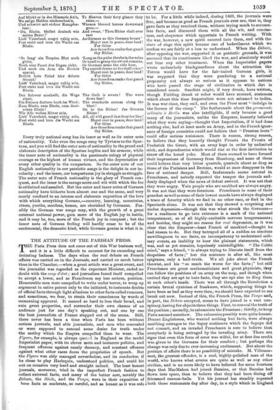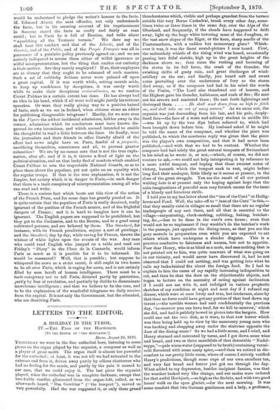THE A'l 1.11UDE OF THE PARISIAN PRESS.
'THE Paris Press does not come out of this War business well, j, it is a little difficult to account for its exceeding and irritating badness. The days when the real debate on French Affairs was carried on in the Journals, and carried on much better than in the Chamber,—when a great article was a great event, and the journalist was regarded as the expectant Minister, ended no -doubt with the coup d'itat ; and journalism found itself compelled to accept a lower, and as Frenchmen say less serious, position. Honourable men were compelled to write under terror, to wrap up argument in satire patent only to the initiated, to insinuate doubts .-of official facts through light allusions to other facts called rumours, and sometimes, we fear, to strain their consciences by words of unmeaning approval. It seemed so hard to lose their bread, and ruin great properties, and surrender their own chance of an -audience just for one day's speaking out, and one by one the best journalists of France stepped out of the arena. Still, there never has been a time when Paris has been without -serious journals, and able journalists, and men who concealed -or were supposed to conceal some desire for truth under 'the motley which the Empire compelled them to wear. The Figaro, for example, is always quoted in England as the model Imperialist paper, with its clever mots and insincere politics, and frequent offences against manly decency, and constant offences -against what other races deem the proprieties of speech. But the Figaro was ably managed nevertheless, and its conductor, if he chose to play Harlequin, understood politics, and could hit out on occasion very hard and straight indeed. The least honest journals, moreover, tried in the imperfect French fashion to -collect external facts, and many of the better sort, notably the De'bats, the Miele, and the Temps, were in their exposition of hose facts as moderate, as careful, and as honest as it was safe to be. For a little while indeed, during 1869, the journals were free, and-became as good as French journals ever are, that is, they gave facts as they received them, without trying much to accumu- late facts, and discussed them with all the wit, and concise- ness, and eloquence which appertain to French writing. With the war, however, a new spirit entered into them, and with the state of siege this spirit became one of bedevilment which we confess we are fairly at a loss to understand. When the Debats, after opposing the war, supported it on patriotic grounds, it was assumed that its constituents liked the war, and absolutely would not bear any other treatment. When the Imperialist papers wrote melancholy blackguardisms about the attraction the Turcos would have for the fair-haired German girls, it was supposed that they were pandering to a national propensity not always so serious as it appears to nations who have passed the stage of civilization in which dirt is considered comic. Smollett might, if very drank, have written, though Fielding drunk or sober would have scorned, sentences which about this time Imperialists were not ashamed to indite. It was war-time, they said, and even the Press must " indulge in the licence of the camp." The fanfaronade about the promenade militaire a Berlin was also intelligible, if only because a good many of the journalists, unlike the Emperor, honestly believed what they were saying—thought that Imperialism, if it had done nothing else, had at least made an Army, and in the French ignor- ance of foreign countries could not believe that " Prussian louts " could offer serious resistance. There is reason, strong reason, to believe that they honestly thought Prussia the Prussia of Frederick the Great, with an army kept in order by unlimited stick, and dependencies which would rise at the first invitation to throw off the hated yoke. Most of them seemed to have formed their impressions of Germany from Homburg, and none of them could believe that very bitter quarrels, quarrels about as deep as those of the Parisians and Bretons, would at once disappear in the face of national danger. Still, fanfaronade seems natural in Frenchmen, and nobody expected the temper the journals sud- denly displayed when the news of defeat arrived. It was not that they were angry. Vain people who are snubbed are always angry. It was not that they were ferocious. Frenchmen in some of their grandest as well as some of their lowest moods have always displayed a trace of ferocity which we find in no other race, or find in the Spaniards alone. It was not that they showed a surprising and undue depression—though this was what struck the Germans— for a readiness to go into extremes is a mark of the national temperament, as of all highly-excitable nervous temperaments; and besides, they might see reason for real depression, as it was clear that the Emperor—least French of mankind—thought he had reason to do. But they betrayed all of a sudden an absolute unwillingness to see facts, an incompetency to understand mili- tary events, an inability to hear the plainest statements, which was, and as yet remains, hopelessly unintelligible. " The Celtic mind," says a friend, " is always trying to liberate itself from the despotism of facts ;" but the sentence is after all, like most epigrams, only a half-truth. We all joke about the French theorist, and his "so much the worse for the facts ;" but still Frenchmen are great mathematicians and great physicists, they can follow the positions of on army on the map, and though when excited they are apt to hate facts, they are apt also to fling them at each other's heads. There was all through the Revolution a certain brutal cynicism of frankness, which, supposing things to have been as bad as they were then, we should have expected to see break out now. Instead of this, the French Press, the Temps and, in part, the Debats excepted, seems to have joined in a vast con- spiracy, having for objects three things. First, to conceal the truth of the position ; secondly, to calumniate the Prussians ; thirdly, to keep Paris amused somehow. The calumnies possibly were quite honest. Decent Englishmen, who wanted nothing but facts, were always ascribing outrages to the Sepoy mutineers which the Sepoys did not commit, and an invaded Frenchman is sure to believe that everybody is being outraged by the invading army. There are signs that even this form of error was wilful, for at first due credit was given to the Germans for their conduct ; but perhaps the change was only due to ever-increasiug excitement. But about the position of affairs there is no possibility of mistake. M. Villemes- sant, the greatest offender, is a cool, highly-polished man of the world, who knows what armies are quite as well as any other civilian, and is no more likely to have believed for some fourteen days that MacMahon had joined Bazaine, or that Bazaine had flown into space, than to believe that they had been dining off fricasseed cannon-balls. Yet his journal has steadily repeated both those statements day after day, in a style which in England
would be understood to pledge the writer's honour to the facts. M. Edmond About, the next offender, not only understands the facts, but in his amusing account of his imprisonment in Saverne stated the facts as coolly and fairly as man could ; but in Paris he is full of Bazaine, and talks about " squelching all the Teutonic vermin." We dare say we shall bear this conduct and that of the Liberte, and of the Gaulois, and of the Public, and of the Peuple Francais was all in pursuance of a patriotic policy previously agreed on ; and we are entirely indisposed to accuse them either of wilful ignorance or wilful misrepresentation, but the thing that excites our curiosity is their motive. Are they merely employed ? If so, their employers are so clumsy that they ought to be ashamed of such masters. Such a set of rubbishy fictions never were palmed off upon a great capital. If it was worth while, setting morals aside, to keep up confidence by deceptions, it was surely worth while to make their deceptions vraisemblantes, as we confess Count Palikao to a certain extent has done. He has always had an idea in his head, which if all went well might justify his reticent speeches. Or were they really giving way to a positive hatred of facts, such as we see in Ireland, when citizens stone an editor for publishing disagreeable telegrams ? Hardly, for we note even in the Figaro the oddest incidental admissions, hidden away in the corner, admissions which its conductors must have known dis- proved its own inventions, and which seemed intended to enable the thoughtful to read a little between the lines. Or finally, were the journalists and their friends in office literally afraid of the effect bad news might have on Paris, fearful of a jacquerie, sacrificing themselves, consciences and all, to prevent greater calamities? We are by no means sure that is not the true expla- nation, after all ; and if it is, it throws a flood of light on the political situation, and on that lucky find of muskets which enabled Count Palikao to arm the respectable National Guards, so as to place them above the populace, yet not quite on an equality with the regular troops. If that is the true explanation, it is not the Empire, but society which is in danger in Paris,—in such danger that there is a tacit conspiracy of misrepresentation among all who can read and write.
There is a curious fact which bears out this view of the action of the French Press, and for some days has greatly puzzled us. It is quite certain that the populace of Paris is really deceived, really ignorant of the position of the French armies, and of the frightful dangers of France ; and it is hard to imagine how it can be ignorant. The English papers are supposed to be prohibited, but they get to the Embassies, and to the Bourse, and to a good many cultivated persons, and are believed by them. The Standard, for instance, with its French proclivities, enjoys a sort of privilege ; and the Standard, day by day, while raving for France, throws the whitest of white lights upon the events of the war. Any man who could read English who jumped on a table and read out Friday's "Diary" in the Place de la Concorde, would inform Paris as much as it is possible for it to be informed. He would be massacred? Well, that is possible ; but suppose he whispered the news as a strict secret, it still ought in two hours to be all over Paris, which is raging for news, and is not entirely filled by men bereft of human intelligence. There must be a tacit conspiracy not to tell Paris, dictated partly by patriotism, partly by fear of revolution, and partially by dislike to disseminate unwelcome intelligence ; and that we believe to be the case, and to be the explanation of the wonderful telegrams we daily receive from the capital. It is not only the Government, but the educated, who are deceiving Paris.































 Previous page
Previous page